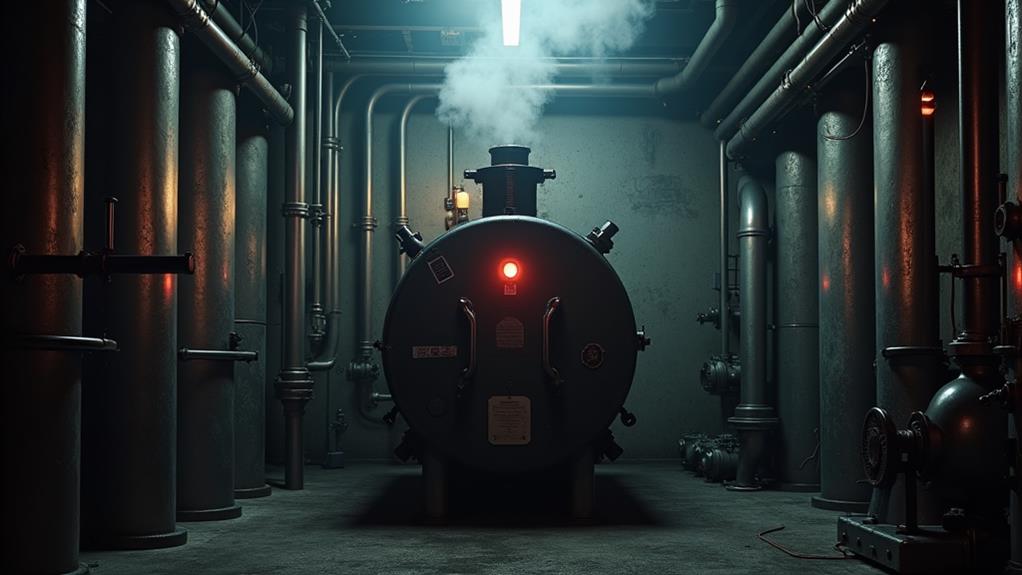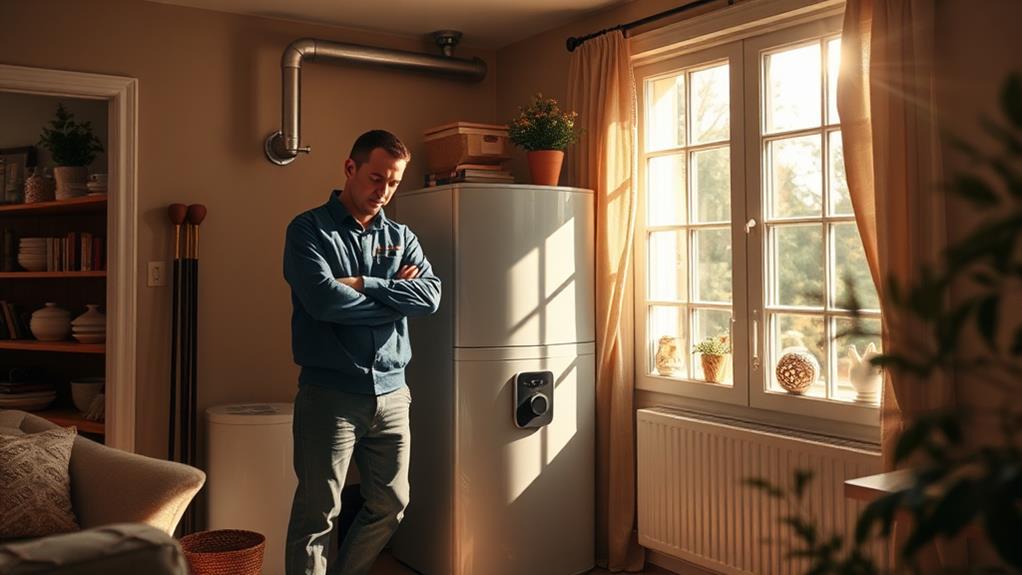You’re facing the Alpha Boiler E37 error, signaling a malfunction in the flow temperature sensor critical for thermal regulation. This issue might stem from faulty thermostat functions, pressure fluctuations, or improper installation. Start by checking the pressure gauge, relief valve, and expansion vessel for leaks or pressure inconsistencies. Use a multimeter to diagnose electrical anomalies. If problems persist, professional diagnostics may be essential due to the complexity of modern boiler systems. Regular maintenance, including servicing expansion vessels and descaling heat exchangers, can be pivotal. For an in-depth understanding of other potential technical resolutions, explore further.
Key insights
- The E37 error code indicates a malfunction with the flow temperature sensor in Alpha boilers.
- Common causes of the E37 error include thermostat issues, pressure fluctuations, and improper maintenance.
- Initial troubleshooting involves checking boiler pressure, inspecting valves for leaks, and bleeding radiators.
- Tools like a multimeter and manometer are essential for accurate diagnostics and repairs.
- Persistent E37 errors require professional assessment to ensure safe and effective boiler functioning.
Understanding the E37 Error
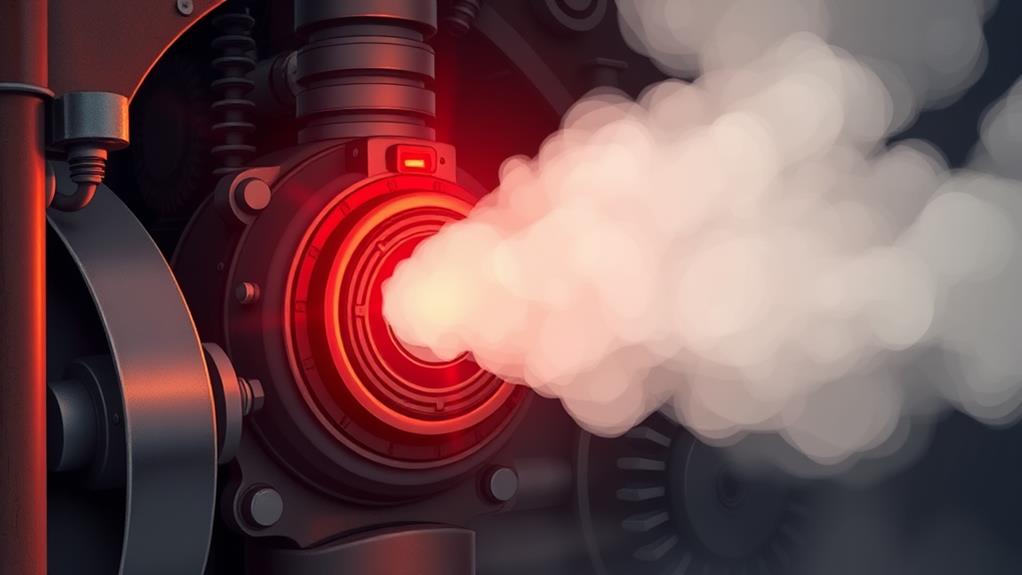
The E37 error code on an Alpha boiler signifies a specific issue related to the flow temperature sensor. When this error appears, it directly impacts the boiler functionality, indicating a malfunction in reading or transmitting temperature data essential for peak performance. This malfunction can potentially lead to erratic heating cycles or even system shutdowns, which are significant disruptions in the smooth operation of commercial or industrial buildings.
The flow temperature sensor plays a significant role in monitoring and regulating the water temperature circulating through the boiler system. It’s essential for maintaining efficient heat distribution and preventing overheating or inadequate heating scenarios. In fact, regular maintenance of such components is important for the plant room’s overall energy efficiency, as it minimizes the chances of wear and tear, ultimately reducing operating costs.
Your boiler’s control unit relies on accurate temperature readings to adjust the burner output and guarantee safe operational parameters. If the E37 error arises, it suggests a disruption in this data exchange. The sensor’s inability to relay precise information can impede the boiler’s modulation capabilities, affecting energy efficiency and thermal comfort.
To resolve the E37 error, you must first verify the sensor’s connection integrity and its calibration status. Confirming the sensor is functional and properly interfaced with the control unit is essential. Recognize that any persistent E37 error could necessitate further diagnostics by a qualified technician to maintain your boiler’s functionality and reliability.
Common Causes of E37 Error
Encountering the E37 error often stems from several technical issues within the boiler system. One prevalent cause is thermostat issues. The thermostat acts as the command center for temperature regulation. If it’s malfunctioning, it disrupts the boiler’s operation, leading to the E37 error. Thermostat issues can arise from improper calibration, wiring anomalies, or sensor degradation. When the thermostat fails to communicate the correct temperature settings, the boiler’s response mechanism becomes erratic, triggering error codes.
Furthermore, the significance of regular commercial boiler servicing cannot be overstated. Keeping an eye on these issues and ensuring regular maintenance can help prevent unexpected breakdowns and improve operational efficiency.
Pressure fluctuations are another primary culprit. Boilers require a consistent pressure level to maintain efficient functionality. Pressure fluctuations result from leaks, faulty pressure relief valves, or compromised expansion vessels. These inconsistencies can lead to an imbalance in the system, causing the E37 error to manifest. When pressure deviates from the prescribed range, it creates operational inefficiencies, compelling the boiler to enter a fault state.
Moreover, improper installation or maintenance lapses can exacerbate these issues. Incorrect component placement or the use of substandard parts may further destabilize the system. Regular maintenance and monitoring of these components are essential to prevent the E37 error. By understanding these technical intricacies, you can better anticipate and address the root causes of the E37 error in your Alpha boiler.
Initial Troubleshooting Steps
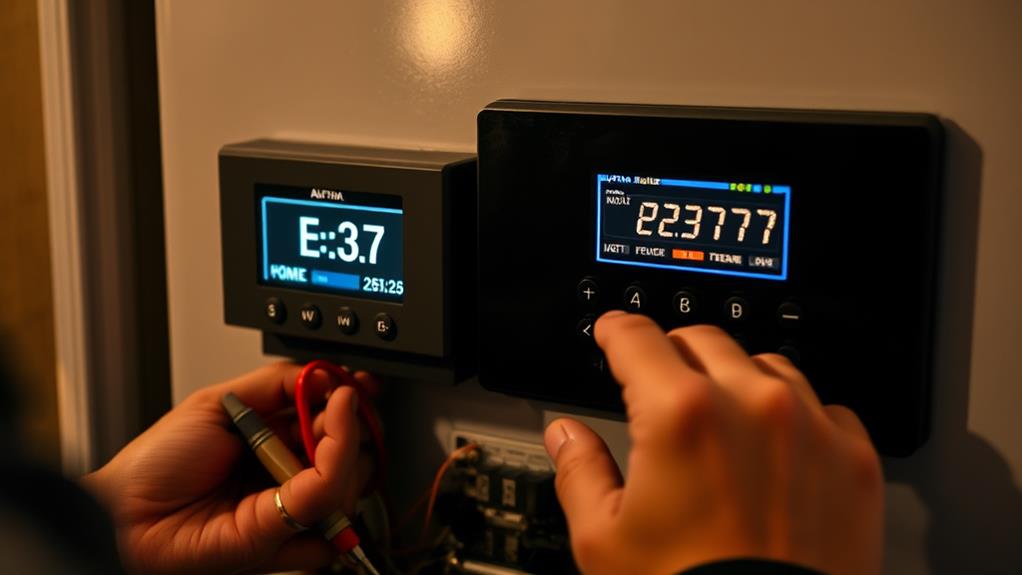
Tackling the E37 error in your Alpha boiler requires a systematic approach to troubleshooting. First, let’s explore the error code itself. E37 typically signifies a boiler malfunction linked to the pressure sensor failing to detect the correct system pressure. Begin by verifying the boiler’s pressure gauge. It’s imperative that the pressure is within the manufacturer’s specified range, usually between 1.0 and 1.5 bar when the system is cold.
Next, inspect the pressure relief valve. If it’s leaking, it may cause a drop in pressure, triggering the error code. Tighten any loose connections, ensuring that the valve is functioning efficiently. Then, examine the expansion vessel. A compromised diaphragm or inadequate pre-charge pressure can contribute to pressure inconsistencies, leading to boiler malfunctions. It’s worth noting that regular maintenance is critical for peak boiler performance and to prevent such issues. Professional advice on maintenance schedules is highly recommended.
Check for airlocks in the system. Bleed the radiators to expel trapped air, which can disrupt pressure readings. Additionally, scrutinize the pressure sensor itself; debris or scaling can result in inaccurate readings. Importantly, during maintenance, energy efficiency enhancement strategies can be implemented to prevent such errors. Clean or replace the sensor if necessary.
Lastly, reset the boiler by turning it off and back on. This can occasionally clear transient errors. If the error persists, it’s advisable to consult a qualified technician for further assessment.
Tools Needed for Repair
When addressing boiler issues like the E37 error, having the right tools at your disposal is crucial. You’ll need specific repair tools and safety equipment to effectively troubleshoot and resolve this issue. With the complexity of gas systems found in Commercial Gas Safety Certificate London, it’s important to have a thorough set of tools. Begin with a multimeter to measure electrical continuity and voltage across components. A manometer, necessary for gas pressure testing, guarantees the boiler operates within spec. Utilize a set of insulated screwdrivers to safely access and adjust internal elements.
Adjustable wrenches and pliers will aid in manipulating pipework and securing fittings. Safety equipment is paramount; you’ll need protective gloves and goggles to safeguard against chemical exposure and debris. A carbon monoxide detector is crucial, alerting you to dangerous gas emissions during the repair process. Don’t forget a non-contact voltage tester to verify circuit de-energization, minimizing electrical hazard risks.
A boiler-specific service manual can provide component schematics and diagnostic flowcharts, guiding you through the repair intricacies. Keep a flashlight handy for illuminating obscured areas within the boiler chassis. Finally, make sure you have a set of hex keys for accessing boiler panels and internal fixtures. Armed with these tools and equipment, you’re ready to tackle the E37 error with precision and confidence.
When to Call a Professional
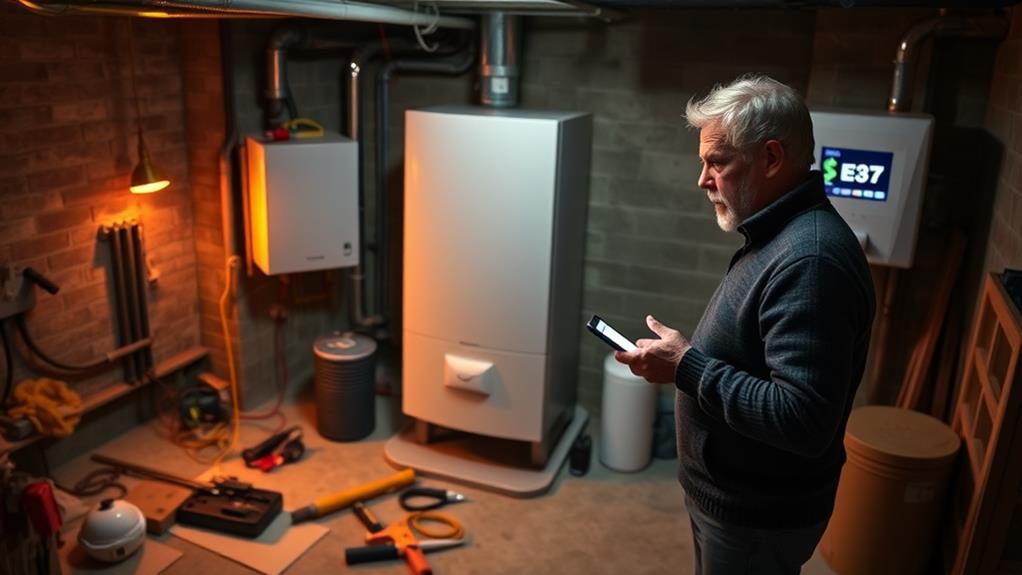
Recognizing the need for professional intervention is essential when dealing with complex boiler issues like the E37 error code. This error often signals intricate problems within the system, such as malfunctioning sensors or control faults, that necessitate a skilled technician’s expertise. Just like the intricate nature of commercial heat pumps, boilers have their complexities that require professional handling. Attempting a DIY fix without adequate knowledge can exacerbate the issue, leading to elevated repair costs. Professionals possess the diagnostic tools and technical acumen required to pinpoint and resolve the root cause efficiently.
In scenarios where the boiler ceases to function, similar to a malfunctioning heat pump, engaging emergency services becomes vital. A non-operational boiler during cold months can lead to significant discomfort and potential property damage due to freezing pipes. Professionals offering emergency services can promptly restore functionality, ensuring minimal downtime.
Moreover, if the error code persists despite multiple reset attempts or if you detect unusual noises or leaks, it’s a clear indication to call a professional. Specialized training allows technicians to navigate the complex electronic circuitry and hydraulic components of the Alpha boiler. Investing in professional intervention not only mitigates immediate repair costs but also extends the boiler’s longevity, ensuring peak performance without recurrent interruptions.
Preventive Maintenance Tips
To mitigate the occurrence of the E37 error code, it’s essential to implement a stringent regular inspection schedule to guarantee peak boiler performance. This is part of making sure that your heating systems meet current safety and environmental standards, enhancing reliability and reducing the likelihood of unexpected failures. These inspections should prioritize essential cleaning practices, focusing on heat exchanger descaling and condensate trap clearance. By doing so, you could prevent costly breakdowns and operational disruptions that could be caused by inefficient systems. Part of this preventive maintenance strategy should also involve monitoring component wear indicators meticulously, such as ignition electrode degradation and pressure sensor drift, to preempt malfunctions. By following these steps, you are adhering to the comprehensive maintenance necessary to safeguard your heating system and business operations.
Regular Inspection Schedule
A regular inspection schedule is paramount for maintaining the ideal performance of your Alpha boiler and preventing the E37 error code. Consistent boiler maintenance will mitigate the risk of unexpected malfunctions, enhance energy efficiency, and prolong the unit’s operational lifespan. By adhering to a structured inspection frequency, you’re guaranteeing the boiler operates within optimal parameters, minimizing downtimes and costly repairs.
To establish an effective inspection routine, consider the following steps:
- Monthly Checks: Conduct a visual inspection of the boiler’s external components. Look for leaks, corrosion, or unusual noises. Verify that the pressure gauge readings are within the manufacturer’s specified range.
- Quarterly Assessments: Perform a more thorough examination. Inspect the flue system for blockages and assess the burner and heat exchanger for signs of wear or damage. Verify that safety devices are functioning correctly to prevent hazardous conditions.
- Annual Professional Servicing: Engage a qualified technician to conduct a detailed assessment of the boiler. This includes testing combustion efficiency, calibrating control systems, and examining internal components for deterioration.
Essential Cleaning Practices
While maintaining a regular inspection schedule greatly reduces the risk of encountering the E37 error code, integrating vital cleaning practices into your routine further fortifies your Alpha boiler’s reliability. Implementing a precise cleaning frequency is essential. You should perform a thorough cleaning of the heat exchanger and burner assembly every six months to prevent soot accumulation, which can compromise efficiency and trigger faults. Don’t forget the condensate trap; make sure it’s devoid of debris quarterly, as blockages can lead to error codes.
In your maintenance checklist, include a systematic inspection of all air intake and exhaust ducts. Cleaning these components guarantees unobstructed airflow, vital for peak combustion and system performance. Utilize a soft brush to remove any dust or dirt accumulation on control panels and electronic components, thereby safeguarding them from overheating or electrical faults.
Regularly descale your boiler’s interior waterways using an appropriate chemical descaler to prevent mineral buildup, which can impair heat transfer and cause unnecessary strain on the system. Each cleaning task in your maintenance checklist enhances operational efficiency and prolongs the lifespan of your Alpha boiler, minimizing the likelihood of encountering the E37 error code.
Component Wear Indicators
Even though regular maintenance is essential, understanding component wear indicators is crucial for preemptive action against the E37 error code. By mastering wear detection, you can identify potential failures before they lead to costly component replacement. The E37 error often points to issues with the boiler’s pressure sensor, pump, or heat exchanger. Recognizing signs of wear in these areas can save you from unexpected breakdowns.
To effectively monitor your Alpha boiler, consider these key indicators:
- Pressure Sensor Fluctuations: If you’re noticing erratic pressure readings or inconsistent outputs, this is a red flag. A malfunctioning pressure sensor can trigger the E37 error, necessitating prompt component replacement.
- Pump Performance Variability: Listen for unusual noises or vibrations coming from the pump. These are telltale signs of wear that could escalate into a complete pump failure, impacting the boiler’s efficiency and risking an E37 code.
- Heat Exchanger Efficiency: A drop in heat exchanger performance might manifest as insufficient heating. Regular inspection for corrosion or scale buildup will aid in wear detection, ensuring timely intervention.
Benefits of Timely Repairs
Timely repair of your Alpha Boiler when encountering the E37 error code guarantees ideal system efficiency and prevents costly malfunctions. Addressing this issue promptly results in significant cost savings, as early intervention minimizes the need for extensive repairs or component replacements. By rectifying the error code immediately, you guarantee increased efficiency, optimizing the boiler’s operational throughput.
Failure to address the E37 error code can lead to suboptimal performance, where the boiler may operate below its designed energy efficiency levels. This deviation can escalate operational costs due to excessive fuel or energy consumption. Furthermore, prolonged neglect of repairs may exacerbate existing defects, leading to potential system failures that require extensive overhauls, thereby inflating repair expenses.
A proactive approach to maintenance allows you to mitigate the risk of cascading failures that could compromise the entire heating system. By consulting a certified technician immediately, you can leverage predictive maintenance strategies that prolong the lifespan of your boiler. This not only enhances thermal efficiency but also guarantees regulatory compliance with emission standards. In summary, addressing the E37 error code at the earliest opportunity maximizes performance, extends longevity, and substantially reduces operational expenditures.
Frequently Asked Questions
Can the E37 Error Affect My Boiler’s Energy Efficiency?
Yes, an error code like E37 can impact your boiler’s energy efficiency. When your boiler’s performance is compromised, it often results in higher energy consumption. Faulty components or system malfunctions could lead to inefficient heat distribution or increased running time. Addressing the error swiftly guarantees ideal operation and minimizes unnecessary energy loss. Regular diagnostics and maintenance are vital to maintaining the system’s efficiency and reducing overall energy expenditure.
Are There Any Temporary Fixes for the E37 Error?
You’re facing a monumental challenge, akin to taming a beast when dealing with error codes. For temporary solutions, immerse yourself in the labyrinth of troubleshooting tips. First, reset the system—this isn’t just flipping a switch, it’s a strategic move to recalibrate. Next, inspect connections; loose wires are your nemesis. Finally, purging air from the system might restore harmony. These ephemeral fixes are your arsenal in the war against operational disruptions.
How Long Does It Typically Take to Repair an E37 Error?
When addressing the issue, repair duration varies depending on the diagnostic complexity and parts availability. Typically, a service technician can resolve it within 2-4 hours. The process involves intricate system checks, component assessments, and potential replacement of defective elements. Confirm the technician conducts a thorough analysis of the boiler’s internal circuitry and sensor calibration. Timely intervention minimizes downtime and optimizes operational efficiency, confirming your system’s functionality is swiftly restored.
Is the E37 Error Covered Under Boiler Warranties?
Investigate the truth behind whether your boiler’s specific error falls under warranty terms. Typically, manufacturers outline what malfunctions are covered. If your error is a common issue, it might be included, reducing repair costs considerably. However, exclusions apply, often linked to user errors or lack of maintenance. Always review your warranty documentation thoroughly, focusing on clauses about repair costs and coverage. Contact your provider to clarify any ambiguities.
Can Weather Conditions Influence the Occurrence of an E37 Error?
Weather conditions can indeed influence boiler malfunctions. Cold weather might exacerbate issues, making regular boiler maintenance essential. You should guarantee proper insulation and check for frozen condensate pipes. During error troubleshooting, examine external factors like humidity and temperature fluctuations that might affect sensor readings or fuel combustion. By understanding these environmental impacts, you can effectively diagnose issues and prevent recurrent errors through proactive adjustments and timely inspections.
Summary
In summary, tackling the E37 error on your Alpha boiler requires a methodical approach. By understanding its causes and performing initial troubleshooting, you’re already ahead of the game. Equip yourself with necessary tools, but know when to throw in the towel and call a professional. Consistent preventive maintenance is your ticket to avoiding future hiccups and ensuring peak boiler performance. Timely repairs not only save energy but also extend your boiler’s lifespan, keeping your home’s heart beating smoothly.

